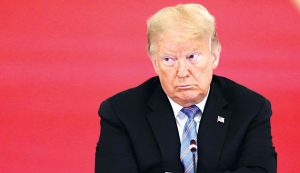 President Donald Trump on Tuesday ordered an end to Hong Kong’s special status under US law to punish China for what he called “oppressive actions” against the former British colony, prompting Beijing to warn of retaliatory sanctions.
President Donald Trump on Tuesday ordered an end to Hong Kong’s special status under US law to punish China for what he called “oppressive actions” against the former British colony, prompting Beijing to warn of retaliatory sanctions.
Citing China’s decision to enact a new national security law for Hong Kong, Trump signed an executive order that he said would end the preferential economic treatment for the city.
“No special privileges, no special economic treatment and no export of sensitive technologies,” he told a news conference.
Acting on a Tuesday deadline, he also signed a bill approved by the US Congress to penalize banks doing business with Chinese officials who implement the new security law.
“Today I signed legislation, and an executive order to hold China accountable for its aggressive actions against the people of Hong Kong, Trump said.
“Hong Kong will now be treated the same as mainland China,” he added.
Under the executive order, US property would be blocked of any person determined to be responsible for or complicit in “actions or policies that undermine democratic processes or institutions in Hong Kong,” according to the text of the document released by the White House.
It also directs officials to “revoke license exceptions for exports to Hong Kong,” and includes revoking special treatment for Hong Kong passport holders.
China’s foreign ministry said on Wednesday Beijing will impose retaliatory sanctions against US individuals and entities in response to the law targeting banks.
Critics of the security law fear it will crush the wide-ranging freedoms promised to Hong Kong when it returned to Chinese rule in 1997, while supporters say it will bring stability to the city after a year of sometimes violent anti-government protests.
The security law punishes what Beijing broadly defines as subversion, secession, terrorism and collusion with foreign forces with up to life in prison.
Analysts say that completely ending Hong Kong’s special treatment could prove self-defeating for the United States. Hong Kong was the source of the largest bilateral US goods trade surplus last year, at $26.1 billion, US Census Bureau data shows.
